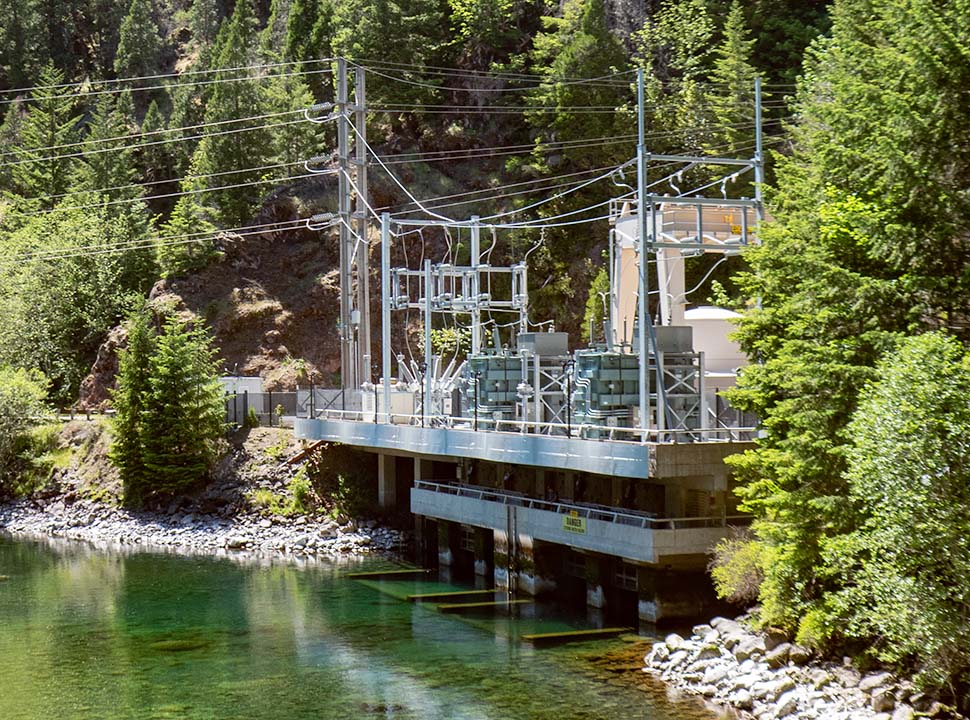Electricity Supply Planning helps utilities understand the resources, technology, and infrastructure that will be needed to meet customers' future electricity needs.
EWEB's ongoing Electricity Supply Planning effort is aimed at optimizing our power resources, assets, infrastructure, and customer products and services so that we can continue to serve our community with clean, affordable and reliable power, consistent with the values of our customer-owners.
We are exploring questions such as:
- How will the demand for electricity change over time?
- What risks does EWEB need to plan for and mitigate?
- What products and services will customers expect?
- What investments are needed?
- How can we partner with others across the region to optimize the interconnected electric grid?
Electrification Impact Study
In early 2020, EWEB initiated a study of the impacts of widespread electrification on our community. In this study, EWEB will hypothesize various electrification scenarios and assess potential impacts to power supply, demand, local infrastructure, and community greenhouse gas (GHG) emissions.
Electrification is a term for replacing direct fossil fuel use (e.g., natural gas, heating oil, gasoline) with electricity in order to reduce greenhouse gas emissions.
The study aims to answer five questions:
- How might legislation and local ordinances impact the rate of electrification in Eugene?
- How could widespread electrification impact local electricity demand and consumption patterns?
- What impact would electrification have on EWEB's power system (generation, transmission, distribution, etc.)?
- What role might energy efficiency and demand-side flexibility play in mitigating challenging outcomes of mass electrification?
- What are the potential costs, benefits, and impacts of various electrification futures?
The electrification study was completed in phases, with Phase 1 focusing on potential changes to demand and consumption patterns, generation needs, and environmental impacts from electrification of small vehicles, water and space heating. Phase 1 was completed in October 2020. Phase 2 of the study focused on the economics of electrification, and was completed in November 2021.
Key Findings of EWEB's Electrification Study
Adoption rates for electric vehicles, space heating and water heating are subject to wide bands of uncertainty with economics, technology and legislation among key factors influencing customer choices. A combination of ample, clean energy resources and a strong legacy of energy efficiency programs puts EWEB in a strong position to support electrification, both for our own customers and within the larger region.
This study finds:
- Eugene residents could reduce community carbon emissions by 45% compared to 2017 levels, primarily through EV adoption. Aggressive changes across all sectors (including the natural gas sector by increasing use of Renewable Natural Gas), could lead to even greater carbon reductions—60% compared to 2017 levels.
- The most financially beneficial electrification opportunities come from electric vehicles and heat pump water heaters.
- By 2040, 85-95% of the vehicles on the road could be electric, and EVs provide benefits to vehicle owners, other electric ratepayers and society as a whole:
- All EVs, regardless of vehicle type, are expected to become cheaper than gas-powered cars before 2030.
- Because of EWEB's nearly carbon-free power, upgrading vehicles from gas to electric power can reduce air pollution and create a better, cleaner environment.
- By 2040, EV adoption could cut Eugene's total carbon emissions by almost 40%.
- Charging EVs during "off-peak" times is a critical component of achieving climate recovery goals and keeping energy affordable for all customers.
- Without significant policy incentives, upgrading gas space heating systems to electric has a net cost to the customer over the equipment lifetime, making it less likely that customers will retrofit existing buildings. However, all the heat pump technologies studied deliver significant carbon reduction benefits, and some customers may feel that the climate benefits outweigh the costs.
- Upgrading from gasoline and natural gas to electric power can have beneficial effects on the price of electricity charged to EWEB customers, as increased electric revenues can be used to cover the fixed costs of the utility, reduce rates or pay for infrastructure investments.
- While EWEB has near term capacity to handle additional load from electrification, under the highest forecasted electrification rates, EWEB might have to purchase additional power resources or build additional infrastructure to meet electricity needs.
Read the Reports

Read cover letter from General Manager Frank Lawson

Read cover letter from General Manager Frank Lawson
What's next?
The study is part of EWEB's larger and ongoing Electricity Supply Planning (ESP) effort. Electricity Supply Planning includes a broad set of actions, such as evaluating power portfolio options, negotiating power purchase agreements, managing infrastructure, and developing customer products and services, all with the goal continuing to serve our community over the long-term with clean, affordable and reliable power. This electrification study helps EWEB understand our customer's demand for electricity in the future. In 2022 EWEB will begin preparing our next Integrated Resource Plan, a process aimed at helping EWEB make decisions about long-term power generation resources. This electrification study will help us understand the potential impacts of electrification on those decisions.
Public Involvement
Creating our energy future is a team sport! We invite you to stay informed and involved by:
- Checking this website for updates
- Signing up to receive news and updates via email
- Attending EWEB Board of Commissioners meetings
- Watching EWEB communications for updates and public meeting announcements
![]()
Curious about electrification and Electricity Supply Planning?
We would love to hear from you!
Send your comments or questions to EWEB's Electricity Supply Planning team at esp@eweb.org.
Related News and Information
EWEB is Exploring the Impacts of Widespread Electrification in our Community
Nov. 2, 2021 Board Meeting Electrification Study Phase 2 Presentation
New Carbon Offsets Programs Will Help Community Collaborate on Climate Solutions
EWEB's New EV Programs Forward the Charge to Decarbonize Eugene
EWEB helps the City of Eugene lower its carbon footprint
Revisiting EWEB's Climate Policies during COP26
#ClimateWeek: 5 ways EWEB is addressing climate change
Could a Texas-like Power Crisis Happen Here?
EWEB Explores Renewable Hydrogen Project
EWEB Shares Preliminary Results of Electrification Impact Analysis Report
Nov. 2, 2020 Board memo; Presentation video recording (starts at 1:58:00)
Aug. 4, 2020 Board meeting Electrification Impact Analysis Report Draft Review
EWEB Will Retain Stone Creek Hydro Project under New Management Contracts
EWEB Announces Electrification Impact Study as Earth Day Celebrates 50th Anniversary
EWEB's Largest Power Supplier Visits Eugene to Discuss Costs, Climate and Changing Energy Needs
March 3, 2020 Board of Commissioners Meeting & Presentation by Elliot Mainzer, Administrator & CEO of BPA Audio recording
Feb. 5, 2020 Energy and Planning Public Presentation Slides
Feb. 4, 2020 Board meeting 2021 IRP Engagement Plan Memo
Electricity Supply Planning brochure
What is Integrated Resource Planning?
EWEB Strategic Plan
EWEB Climate Change Policy
Understanding Peak Power



